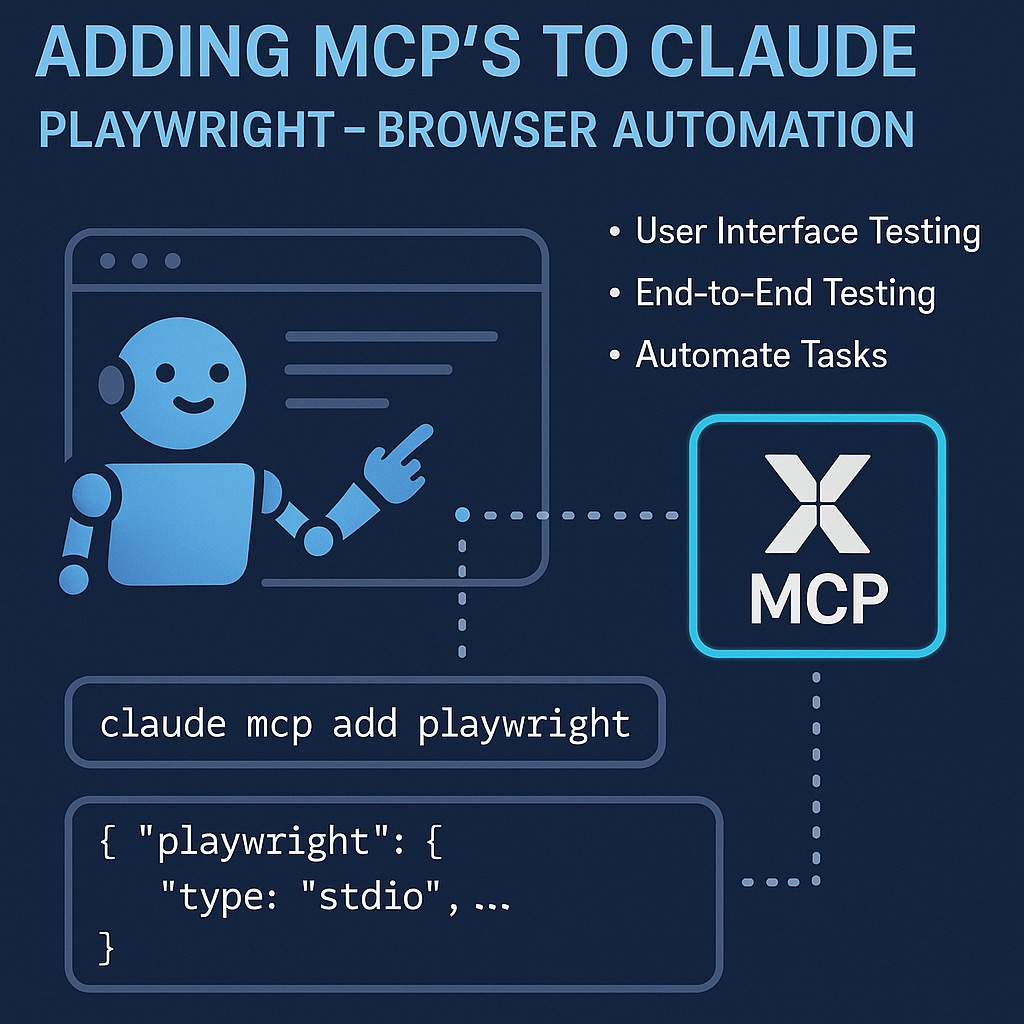Modern web applications require robust testing strategies to ensure functionality, performance, and reliability. The integration of Playwright MCP (Model Context Protocol) with Claude Code represents a significant advancement in browser automation capabilities, enabling AI-driven testing workflows that were previously impossible.
What is Playwright MCP?
Playwright MCP is a specialized server that bridges the gap between AI assistants like Claude Code and browser automation tasks. Unlike simple web scraping tools, Playwright MCP provides comprehensive browser interaction capabilities that mirror real user behavior.
Core Capabilities
The Playwright MCP server excels in several key areas:
Interactive Browser Control: Click buttons, fill forms, navigate between pages, and interact with complex web elements just as a human user would.
Visual Testing: Capture screenshots at any point during automation workflows, enabling visual regression testing and debugging.
End-to-End Testing: Automate complete user journeys from login to task completion, ensuring your application works seamlessly across all user touchpoints.
Cross-Browser Compatibility: Test across different browsers and devices to guarantee consistent user experiences.
Why Browser Automation Matters for Modern Applications
In today's digital landscape, user interface reliability directly impacts business success. A single broken form or malfunctioning button can cost significant revenue and damage user trust. Traditional testing approaches often fall short because they:
- Require extensive manual effort to maintain
- Miss edge cases that real users encounter
- Cannot scale with rapid development cycles
- Lack the context to test complex user workflows
Playwright MCP addresses these challenges by enabling intelligent, AI-guided testing that adapts to application changes and identifies potential issues before they reach production.
Integrating Playwright MCP with Claude Code
The integration process is straightforward, with two primary installation methods:
Option 1: Claude Code CLI Integration
The fastest way to add Playwright MCP is through the Claude Code command-line interface:
claude mcp add playwright npx @playwright/mcp@latest -s userThis command automatically configures the MCP server and makes it available for immediate use in your Claude Code sessions.
Option 2: Manual Configuration
For users who prefer manual setup or need custom configurations, add the following to your `claude.json` file in your root user directory (typically `/users/yourname/claude.json`):
{
"playwright": {
"type": "stdio",
"command": "npx",
"args": [
"@playwright/mcp@latest"
],
"env": {}
}
}Practical Applications for HookHub and Beyond
The integration of Playwright MCP with applications like HookHub demonstrates the practical value of AI-driven browser automation:
Automated UI Testing
Playwright MCP can systematically test every user interaction path, from basic navigation to complex multi-step workflows. This ensures that new features don't break existing functionality and that performance standards are maintained across all user touchpoints.
Regression Testing
When applications evolve rapidly, maintaining test coverage becomes challenging. Playwright MCP can automatically adapt test scenarios based on UI changes, reducing the maintenance overhead typically associated with automated testing suites.
Performance Validation
Beyond functionality testing, Playwright MCP can measure page load times, interaction responsiveness, and other performance metrics that directly impact user satisfaction.
Implementation Best Practices
Start with Critical User Journeys
Begin by automating tests for your application's most important user paths. These typically include:
1. User registration and authentication flows
2. Core feature interactions that drive business value
3. Payment and transaction processes
4. Data entry and form submission workflows
Leverage AI-Guided Test Creation
Unlike traditional automation tools that require explicit programming, Playwright MCP can interpret natural language instructions to create sophisticated test scenarios. This dramatically reduces the technical barrier to comprehensive test coverage.
Integrate with Continuous Deployment
Configure Playwright MCP tests to run automatically as part of your deployment pipeline. This ensures that every code change is validated against real user behavior patterns before reaching production.
Beyond Testing: Advanced Automation Use Cases
While testing represents the primary use case, Playwright MCP opens possibilities for other automation scenarios:
Data Migration: Automate the transfer of data between systems through web interfaces when API access isn't available.
Competitive Analysis: Monitor competitor websites for feature changes, pricing updates, or new product launches.
User Experience Research: Simulate user behaviors to identify friction points and optimization opportunities in your application workflows.
Getting Started with Your First Automation
Once Playwright MCP is integrated with Claude Code, you can begin creating browser automation workflows using natural language descriptions. The AI understands context and can translate high-level objectives into specific browser actions.
For example, you might instruct Claude Code to "Test the user registration process by filling out the form with valid data, submitting it, and verifying the success message appears." The Playwright MCP server will handle the technical implementation while you focus on the testing strategy.
Security and Best Practices
When implementing browser automation, always consider security implications:
- Use dedicated testing environments that mirror production configurations
- Implement proper authentication and authorization testing
- Validate that automated tests don't expose sensitive data
- Regularly update Playwright MCP to benefit from security patches and improvements
The Future of AI-Driven Testing
The integration of Playwright MCP with Claude Code represents just the beginning of AI-driven quality assurance. As these tools evolve, we can expect even more sophisticated testing capabilities, including:
- Predictive testing that identifies potential issues before they occur
- Self-healing tests that automatically adapt to application changes
- Intelligent test optimization that focuses effort on the most critical application areas
Additional Resources
Official Playwright MCP Repository - Access the complete source code, documentation, and community contributions for the Playwright MCP server, including advanced configuration options and troubleshooting guides.
Claude Code MCP Documentation - Comprehensive guide to Model Context Protocol integration with Claude Code, covering installation, configuration, and best practices for various MCP servers.
Connect with Us
See this post on our LinkedIn - Check out our latest insights on Playwright MCP integration with Claude Code.
Follow us for more insights on AI automation, browser testing, and Claude Code integrations!
